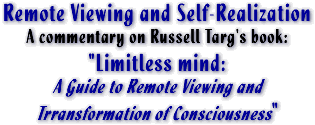
Current Update as of October 17, 2004
Inspired by The Edgar Cayce Institute for Intuitive Studies
Edited by HENRY REED, Ph.D.

Current Update as of October 17, 2004 Inspired by The Edgar Cayce Institute for Intuitive Studies Edited by HENRY REED, Ph.D. |
|||
|
|
||||

(Henry
Reed)
What would Edgar Cayce think about the recent fascination with remote viewing? He’d have to admit he’d done it himself sometimes, like when he announced from his self-induced clairvoyant consciousness that his next client had not yet arrived at home where he was to be for his reading from Cayce, or when Cayce noted that the prescribed remedy, "oil of smoke" was hidden in the back room shelf of the pharmacist. Cayce used remote viewing, and especially "remote knowing" to help others, and thus he would be satisfied with its serviceability. On the other hand, so much of his readings were filled with wisdom, providing much more guidance than could be provided by what a remote video camera could see, that his work involved more skills than simply remote viewing. I believe that Mr. Cayce would say remote viewing was, in itself, not sufficient. I suspect that, independent of the purposes toward which remote viewing might be applied, its procedures make self-actualization doubtful. Simply relaxing the mind may be sufficient to experience and report imagery that others might evaluate for its validity, but it doesn’t seem sufficient to provide self-actualization guidance to the person practicing this skill. Something else has to be added. What is required beyond merely freeing consciousness is "raising one’s consciousness to an ideal." Such grooming of consciousness might prove useful to become a channel of wisdom. The purpose to which value added remote viewing might be applied would also affect its serviceability for self-actualization. Remote viewing sessions typically begin with a "tasking assignment." As a tasking focus, I suggest something akin to an Edgar Cayce affirmation, with a bit of precognition thrown in: "I foresee an opportunity coming to me today where I may be of service to someone else by discovering more of my soul’s abilities." I turned to a recent book by one of the pioneers of remote viewing. Russell Targ, Ph.D., writes in Limitless mind: A guide to remote viewing and transformation of consciousness (New World Library), to discover that the author writes, "Why bother with ESP? …Dzogchen [Buddhist ideal of "great perfection"] teaches us to look directly at our awareness and experience the geometry of consciousness—the relationship of our awareness to the space-time in which we live…. these teachings of expanded awareness and the experience of spaciousness are not about self-improvement or gaining power; they are about self-realization: discovering who we really are…. This can be revealed in many ways, one of them being the practice of remote viewing….we discover through this process that we are the flow of loving awareness that is available to us whenever we are quiet and peaceful." The question I have in considering Targ’s thoughtful and valuable book is whether his support of remote viewing as a tool of self-realization comes from the meditative part of the practice (in which case meditation itself may be a more direct route), from what is remotely viewed (as in my suggested tasking focus), or from the theoretical implications of the results of remote viewing, namely, that ESP is real and that there is more to us than the space-time materiality. Many have experienced ESP effects, yet go on living in material consciousness, so I suspect that this third alternative is not much of a candidate for the source of remote viewing’s support of self-realization. Targ does provide four proven applications of remote viewing: evaluating given choices, locating objects or persons, medical diagnosis, and forecasting. At the end of his book, he confesses that he has spent his life trying to change a rocket scientist into a human being. His ESP research motivated him further, but it was contact with a spiritual teacher, Mangaji, that did the trick, opening his heart. In the final analysis, Targ admits that remote viewing itself is not a spiritual path. He claims that it is the meditative skill developed by it that can, when furthered by spiritual mentoring, lead to the self-realization that "we are the love we seek". The meditative skill he refers to is that of becoming aware of awareness itself, because that is where the boundless self awaits discovery. I
find myself uplifted by Targ’s book and feel a kinship with his desire
to explain the value of ESP research in the context of the spiritual search.
I now realize that my own suggestion about how to use remote viewing for
self-actualization, although of value, actually misses the mark. There
really is no need to go "remote" as what I’m seeking is within
my own open heart. I agree with the author that the best way to keep it
open is through gratitude. With such an attitude, I’m sure I’ll have many
opportunities to grow by helping others without having to remote view
the opportunity in advance. |
||||
|
||||
|
|
||||
|
Web Design by HENRY REED and MARIO HADAM. All Rights Reserved. |
||||